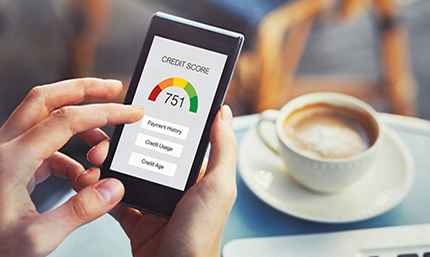News & Tips
Certificates of Deposit (CDs): What You Need to Know

Did you know that your savings could earn even more money for you? Certificates of deposit—also known as CDs or CoDs—are a special type of savings account with a guaranteed rate of return over a certain timeframe so you can give your savings a raise even while you sleep! Learn everything you need to know about CDs in this article.
How Certificates of Deposit Work
A person opens a CD by depositing money into the account for a fixed period at the interest rate the financial institute is currently offering. Said another way, certificates of deposit earn interest on a lump sum deposit for the agreed-upon period.
Let’s say a bank or credit union offers a two-year CD at 2% interest with a minimum initial balance of $1,000. If someone opens a CD under those conditions, then the interest will accrue on the balance they deposited based on that fixed rate for two years.
Additionally, you’ll often see an associated annual percentage yield (APY) also in percentage form. The APY^ takes both the interest rate and the effect of compound interest into account and assumes no early withdrawals. Compounded interest means that you’ll get interest on your balance/principal—but also earn interest on interest. In other words, you’ll earn more interest.
CDs with shorter terms typically pay a lower rate of interest than ones with longer terms. If interest rates drop in the middle of the CD’s term, the CD interest rate stays the same; the same is true if CD interest rates increase during the term. Let’s take a look at an example:
- Initial Deposit: Let’s say you open a CD with a $5,000 deposit.
- Term: Because you won’t need the funds for a while, it’ll be for a 60-month CD.
- Interest Rate: The interest rate is 3.14% APY^, which is higher than savings rates.
- Earnings: Over that 60-month period, you’ll earn $835.87—so, at the end of your term, you’ll now have $5,835.87.
Our CD calculator can help you calculate how much interest your CD will yield upon maturity.
What You Can Do with a CD Upon Maturity
When the CD term expires (on the CD’s “maturity date”), the depositor has a couple of different options:
- withdraw the money (usually moving the funds into a checking or savings account)
- renew the CD at the same term (different interest rate may apply)
- roll the money into a CD at a different term and interest rate
Although the interest rate is locked in when the depositor opens a new certificate, CD interest rates may well continue to fluctuate during that timeframe based on financial benchmarks. Although this would not affect someone who has a CD rate locked in, it does impact people opening new ones.
At Space Coast Credit Union (SCCU), we offer CD terms between 6 and 60 months (5 years). Here, you can open one or more certificates of deposit at SCCU.
Difference between CDs and Savings Accounts
Certificates of deposit differ from regular savings accounts because the money must stay in the CD throughout the agreed-upon term. If not, then the account holder may face a penalty or early withdrawal fees based on the initial agreement at the time of opening. Because these requirements exist, CDs typically pay a higher interest rate than regular savings accounts. Also, you can’t make additional deposits to the CD.
CDs are attractive for people who want to earn more money than they’d get in a typical savings account while still having a safe way to save their money. You might, for example, want to avoid the volatility of the stock market, and CDs will allow you to accomplish that.
How Certificates of Deposit Became Safe Investments
This type of account existed in Europe as far back as the 1600s. One of the forms of European banking involved a banker taking in deposits, giving the depositors a receipt for the amount of money involved. Banks then used the funds to make loans to merchants, charging them interest. Then, bankers created an interest rate that they would pay the people who deposited the funds, one that was less than what they charged the merchants taking out loans. That’s how the bankers themselves made money on the transactions. Although it's not precisely like the modern version of a CD, it serves as the foundation of the concept, a precursor to modern banking.
In the United States, this type of savings product became available in the early 19th century. Depositors would literally receive certificates that were elegantly embossed with the terms of their agreement connected to their investment. Nowadays, the physical certificate is less ornate, most likely a printed agreement of the amount, rate, and term, and conditions of the account.
Rates paid for CDs have fluctuated significantly over the decades. Before the Federal Reserve was created in 1913, no oversight organization existed in the United States to provide regulation or consistency of financial institution structure. In that era, banks were privately owned and might offer the best CD rates around—but, before federal insurance existed for deposits, the private banks may not be able to keep up their end of the deal. So, depositors may have been offered highly attractive interest rates but not actually receive those funds as promised.
The establishment of the Federal Reserve Act in 1913 provided more uniformity to the U.S. banking system, mandating that financial institutions maintain a certain amount of reserves to meet their commitments even when economic conditions became more challenging. The Federal Reserve Act created a more secure system than before but not as secure as it is today. The modern system didn’t become established until after the stock market crash in 1929—when many people lost the money that they’d put into stocks and, often, bank accounts. In 1933, President Franklin D. Roosevelt signed the Banking Act into law, which created federal insurance coverage for people who deposited their money into federal banks.
Benchmark-wise, what the Federal Reserve has set as the federal funds rate can influence what a financial institution will offer on their CD products. Each financial institution can independently set their rates and terms; they will not be the same across all banks and credit unions.
American banks became insured through the Federal Deposit Insurance Corporation (FDIC), and federal credit unions became insured by National Credit Union Administration (NCUA). That’s how CDs gained the level of safety and security that they now enjoy. Deposits made at SCCU are insured by at least $250,000 per individual depositor by the NCUA. SCCU members and members of other federally insured credit unions have never lost money in insured savings, which includes CDs.
Today’s certificates of deposit are a guaranteed, non-volatile form of savings. Their interest rate is fixed and locked in upon opening the CD. The interest rate given then is what you’ll receive throughout the agreed-upon term. So, as long as you don’t make an early withdrawal and trigger penalties and/or fees, you can count on receiving the interest amount you’ve signed up for.
What to Consider When Looking to Open a CD
Insurance: If you’re looking to invest in a CD, what’s most important is to make sure that the financial institution is federally insured so that you can proceed with confidence knowing that your funds are protected. Although most financial institutions are federally insured, some are privately insured.
Deposit Amount: Then, you’ll want to consider how much money you want to invest. Because you can’t withdraw any funds from certificates of deposit before their maturity date without some sort of penalty, you’ll want to deposit only the amount of money that you can afford to keep in without touching it.
As a rule of thumb, you shouldn’t deposit your emergency savings into a CD, as those funds aren’t accessible without facing fees. However, if you’re saving for a house, you might put those funds into a CD with a term that would mature before you would need them for a down payment or closing costs.
When saving for something big in the future, you might decide to open a CD with some funds you have in savings account so that you can earn interest on that amount while you continue to deposit funds in a separate account. When the CD matures, you could take the funds currently in your savings account; put them into your CD for a new term, and continue to save in your savings account. You can repeat this process for as long as you’d like, earning a higher interest on the funds in the CD.
Rate and Terms: You’ll want to get the best CD rates you can while considering the caveats about choosing the right term for your needs. When comparing CDs from more than one financial institution or within the institution itself, the APY^ provides an apples-to-apples comparison for the CD. Financial institutions are not required to compound interest but, when they do, it offers a better deal for depositors; at SCCU, we compound interest.
Choosing the right term can take some strategy. You’ll want to go through the steps listed above, but then you might also factor in what CD interest rates are expected to do. If, for example, interest rates are expected to go up soon, you might deposit funds into a short-term CD to have them available to reinvest when the anticipated higher rate arrives. Under other economic conditions, you might expect CD interest rates to be going down soon. In that case, you might lock in the higher rate that goes along with a longer-term CD. Remember that, the longer the CD’s term, the higher the rate will likely be.
Certificates of Deposit at SCCU
At SCCU, you can open a CD with as little as $5006 for whichever term you choose, with your funds federally insured by NCUA up to $250,000. Plus, compared to the national average for CD rates, we have some of the best CD rates in Florida. Available terms and interest rates include:
| Term | Dividend Rate | APY^ | Min. Average Daily Balance to Earn APY^ |
|---|---|---|---|
| 3 Months | 4.18% | 4.25% | $500 |
| 6 Months | 4.11% | 4.15% | $500 |
| 9 Months | 3.94% | 4.00% | $500 |
| 12 Months | 3.80% | 3.85% | $500 |
| 18 Months | 3.41% | 3.45% | $500 |
| 24 Months | 3.31% | 3.35% | $500 |
| 30 Months | 3.26% | 3.30% | $500 |
| 36 Months | 3.21% | 3.25% | $500 |
| 42 Months | 3.21% | 3.25% | $500 |
| 48 Months | 3.21% | 3.25% | $500 |
| 54 Months | 3.21% | 3.25% | $500 |
| 60 Months | 3.36% | 3.40% | $500 |
^APY = Annual Percentage Yield.
CD Account rates are accurate as of the date indicated and are subject to change at any time. The minimum deposit required is $500 for all terms. The minimum average daily balance to earn APY (Annual Percentage Yield) is $500. The APY is based on the assumption that interest will remain in the CD Account until maturity. A penalty may be assessed for early withdrawal. Fees may reduce the earnings on the CD Account.
When you open a CD at SCCU, you can receive account alerts to monitor activity; have access to free CALL-24 telephone banking; and receive free statements, and more with no monthly service fees.
How to Build a CD Ladder
Once you deposit funds in a CD, you’ve made a commitment that doesn’t allow you to deposit more funds or withdraw funds early without facing penalty. Because of this, a savvy strategy would be to open multiple CDs of different terms at the same time. CD laddering gives you the chance to maximize on your savings for both short- and long-term goals.
For example, let’s say you’d like to invest $12,000 in CDs, you could deposit:
- $4,000 in a 13-month CD at 3.80 APY^ ($164.92 interest earned)
- $4,000 in a 23-month CD at 4.32 APY^ ($337.75 interest earned)
- $4,000 in a 33-month CD at 4.84% APY^ ($555.22 interest earned)
- Total interest earned: $1,057.89
Keep in mind, you don’t have to divide the funds up equally with a CD ladder. You could also do something like this:
- $2,000 in a 13-month CD at 3.80% APY^ ($82.46 interest earned)
- $4,000 in a 23-month CD at 4.32% APY^ ($337.75 interest earned)
- $6,000 in a 33-month CD at 4.84% APY^ ($832.83 interest earned)
- Total interest earned: $1,253.04
Because CD interest rates may rise later, this strategy also allows you to deposit a short-term CD’s funds upon maturity into a CD term with a higher interest rate. If interest rates end up falling, then at least you know you have some money in a longer-term CD at a high interest rate.
Try running various CD laddering scenarios with our CDs calculator.
Money Market Vs. CD
Money market accounts are another type of savings vehicle available at SCCU. This kind of account comes with tiered interest rates that differ by the account balance. They’re a good choice for maintaining six to twelve months of living expenses because they combine features of savings and checking accounts. As the amount of money in the account goes up in a money market account, so does the interest rate.
However, interest rates you’ll receive on money markets are lower than CD interest rates, and you’ll need at least $2,500 to open a Money Market account at SCCU; contrast that to the minimum amount of $5006 with an SCCU CD. (Note: although the name of the account is “money market,” it’s not related to the stock market.)
So, if you’ve got the ability to set funds aside for the term of the CD you choose, you can earn more interest. If, however, you need more flexibility and accessibility than a CD can provide, then a money market may be a better choice. Both types of accounts are federally insured through NCUA.
IRA CD Accounts
An IRA is an independent retirement account. When you invest your retirement savings into an IRA CD, you’ll have a guaranteed rate of return with maximum security. Stocks and bonds may yield better returns, but CDs are lower risk choices.
In general, traditional IRAs are in demand by people who expect to be in a lower tax bracket after they retire, and IRA CDs will often offer the same tax advantages as other forms of IRAs, depending on your tax filing status. Please see a tax advisor for specifics on your situation.
When you open an IRA CD at SCCU, you’ll benefit from competitive rates and flexible terms. SCCU offers some of the best IRA CD rates available. Plus, just like with our non-retirement CDs, you can open yours with an initial $500 deposit6. Terms of 6 to 60 months are available. To open yours, visit the SCCU branch that’s most conveniently located near you.
Benefits of Being an SCCU Member
Credit unions exist to serve their members — membership usually entails living and/or working in a certain geographical area or having the same employer. They offer a wide range of financial services from accounts to loans to fit the needs of their members.
Plus, all credit unions are not-for-profit organizations. This means that, rather than focusing on maximizing profits for the financial institution, credit unions pool their money to promote savings and provide affordable loans to members. So, when members open accounts like CDs, they can find satisfaction in knowing that their investments can help other members get loans they need.
Because members of a credit union are often part of a community in some way, they often work to give back to their service areas. At SCCU, we offer exclusive rates for our heroes, fundraise for charitable organizations, and more.
Better Interest Rates
Credit unions work to provide valuable benefits to their members, such as offering great interest rates—including some of the best CD rates—as well as better interest rates on mortgages and loan products. Plus, with credit unions, you’ll often see fewer and lower fees overall than you would at banks, including no application fees.
Financial Wellness Emphasis
Credit unions also work to focus on the financial wellness of its members—just like we do at SCCU. We provide a range of educational materials to help members achieve their unique goals along with links to other useful websites. For example:
- Budgeting: The foundation of financial wellness is the budgeting process. This process consists of determining your income and monthly expenses; building up an emergency savings account; and otherwise working towards financial stability and your unique goals. To help, we provide resources such as online calculators and a budgeting worksheet.
- Avoiding Credit Scams: To help, we have created a Fraud Prevention Center. You can also find information on trustworthy government sites such as ones for the Federal Trade Commission and the Consumer Financial Protection Bureau.
- Monitor Credit Scores: As an SCCU member, you can review your FICO® Score free through your online banking account. Figures are updated monthly for your convenience. We also offer ongoing information in our blog, including how good credit scores enhance your purchasing power. You can get a free copy of your credit reports from the three major credit-reporting bureaus annually at AnnualCreditReport.com. Be sure to report any errors or inaccurate information you see to the bureaus.
- Home Buying Center & Auto Buying Center: Our buying centers can help you make better financial decisions for those big purchases, with worksheets, helpful articles, infographics, videos, and more.
We offer our members a variety of tools, resources, and helpful articles, and we encourage you to explore our Financial Wellness page for more information.
More About SCCU
SCCU serves people who live or work in 34 counties in Florida, totaling 580,000+ members. If you’d like to become a member, you can open an account online with a $5 deposit into a Share Savings account, which establishes you as a member-owner of the credit union. If you have questions, please feel free to fill out this form or reach out to us.














































